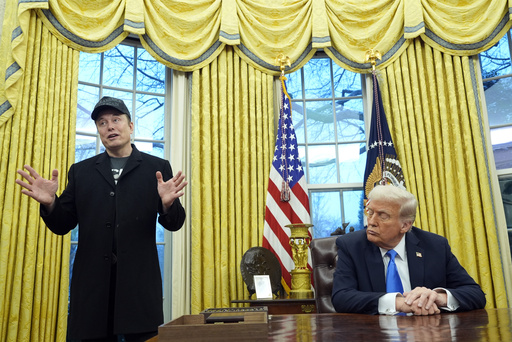WASHINGTON — While some aspects of President Donald Trump’s initiatives are facing hurdles in court, Elon Musk’s Department of Government Efficiency (DOGE) appears to be navigating legal challenges more successfully.
Labor unions, Democratic lawmakers, and federal workers have launched several lawsuits claiming that DOGE is overstepping its bounds regarding privacy rights and undermining the authority of other governmental branches.
However, judges from both major political parties have not consistently sided with these critics. A notable instance involved judges rejecting requests for temporary restraining orders aimed at blocking Musk’s team from accessing important government databases.
U.S. District Judge Randolph Moss, appointed during the Obama administration, emphasized that it is not the responsibility of federal courts to manage the security of information systems within the executive branch.
The relative triumphs seen by DOGE contrast sharply with the legal obstacles Trump has encountered, which have temporarily thwarted his attempts to restrict birthright citizenship, halt congressionally allocated foreign aid, and limit healthcare provisions for transgender youth.
If the legal challenges against Musk’s department continue to falter, he may be able to pursue his agenda of reducing the size of the federal government and workforce without significant interference.
Harrison Fields, the White House deputy press secretary, stated, “The ongoing legal victories supporting the administration shouldn’t surprise anyone aware of our Constitution’s provisions. President Trump and his team are abiding strictly by these guidelines,” adding that attempts to undermine presidential authority are likely to fail.
Cary Coglianese, a specialist in administrative law from the University of Pennsylvania, noted that plaintiffs have struggled to illustrate that they would suffer irreparable harm if DOGE were allowed to proceed with its strategies. “They are ahead of the judiciary on this issue,” he commented.
Skye Perryman of Democracy Forward, which coordinates lawsuits against the administration, countered that no federal judge has yet backed DOGE’s actions.
An anomaly in DOGE’s string of legal successes has emerged in two lawsuits focusing on Treasury Department systems responsible for allocating trillions in federal funds. These databases often contain sensitive details like bank account information and Social Security numbers, which are usually managed by career civil servants.
One Washington judge limited access to only two DOGE employees, while a New York judge placed a temporary block on the department’s access altogether.
Norm Eisen, a lawyer for former and current employees at the U.S. Agency for International Development, argued that it’s premature to conclude that the legal opposition won’t be successful. He highlighted concerns from U.S. District Judge Tanya Chutkan about Musk’s ostensibly “unchecked authority” amidst a case regarding federal data and workforce reductions.
Although Judge Chutkan did not approve a requested temporary restraining order from Democratic state attorneys general, she indicated they might have a solid constitutional argument as the case unfolds. Eisen has accused Musk and DOGE of wielding powers reserved for elected officials or those confirmed by the Senate.
John Yoo, a law professor at UC Berkeley, explained that the administration claims Musk is merely an advisor to the president, lacking independent authority, drawing parallels to a 1990s legal case involving Hillary Clinton’s healthcare task force, which was ruled exempt from open meeting protocols. “This is how they’re succeeding in court,” Yoo remarked.
U.S. District Judge Deborah Boardman heard extensive arguments on a request for a temporary restraining order concerning DOGE’s access to federal personal information. Though she did not reach a decision, she expressed doubt about the labor unions’ legal rationale but inquired why DOGE needed such comprehensive information.
Emily Hall from the Justice Department asserted that DOGE has a mandate to implement far-reaching reforms necessitating broad access. The judge responded that this explanation seemed quite vague.
An important victory for Trump and Musk occurred in Boston, where Judge George O’Toole Jr. allowed the administration to commence its deferred resignation initiative, enabling employees to leave while receiving pay until September 30. This was contested by labor unions, but the judge ruled against them on procedural grounds, citing a lack of legal standing.
Similarly, Judge Moss decided not to prevent Musk’s team from reviewing data from the Education Department, noting that DOGE employees affirmed their commitment to follow legal protocols on information sharing.
U.S. District Judge John Bates also refrained from blocking DOGE’s involvement with the Department of Labor and the Department of Health and Human Services, recognizing serious privacy concerns but concluding that the circumstances did not warrant a judicial intervention.
Administration officials argued that DOGE was not “acting recklessly” or accessing data indiscriminately, emphasizing that their team has undergone security training and signed nondisclosure agreements.




